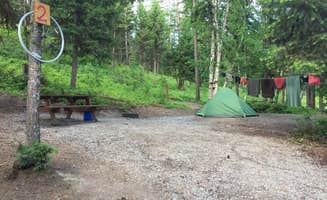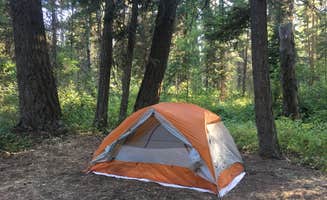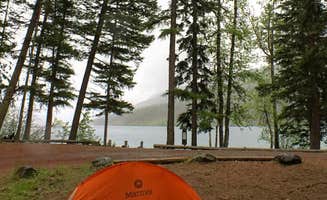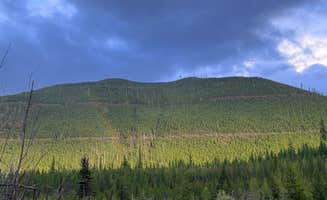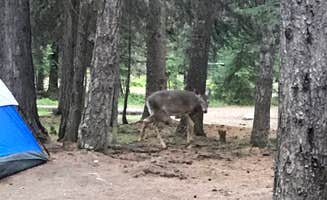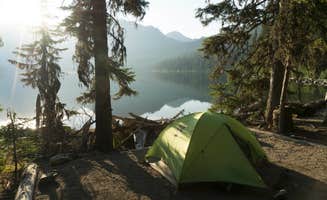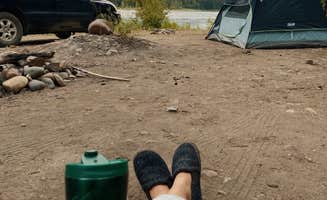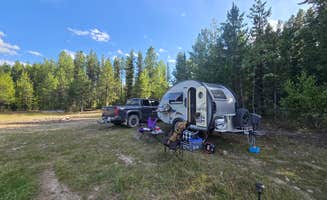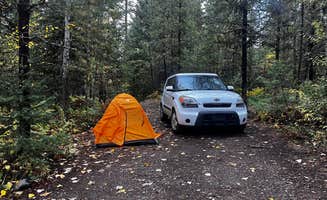Tent campsites near Trego, Montana sit in the transitional terrain between Kootenai National Forest and Flathead Valley, with elevations averaging 3,000-3,500 feet. Summer temperatures typically range from 50°F nights to 85°F days, with significant cooling in September when nighttime temperatures can drop below freezing. Most primitive camping areas require bear-resistant food storage containers or hanging food at least 10 feet off the ground.
What to do
Paddling: water access: Visitors at Yarnell Island Campground can enjoy boat-in tent camping with rocky swimming areas. "There's a great place to swim on the northern side of the small island that has a rocky shelf thigh deep in the water where you can hang out and stack rocks or jump off out into the deeper parts of the lake," notes camper Hannah O.
Wildlife viewing: dawn and dusk: Early mornings provide optimal viewing at most campgrounds. At Bowman Lake Campground, campers report regular deer sightings around camp. "Deer frequent the campsites, sniffing around the fire pits, searching for food, and they're not scared of people. They'll come right up to your tent," reports Lora C.
Stargazing: minimal light pollution: Many sites offer exceptional night sky viewing due to minimal development. "At night, there are a few lights along the bank, but they don't impede the view of the stars. The view of the stars was amazing. The Milky Way was bright," according to a Yarnell Island camper.
What campers like
Remote locations: fewer crowds: Tent campsites with difficult access often reward with solitude. At Kintla Lake Campground, the payoff comes after a challenging drive. "39 miles inside the park. A rough, but beautiful, drive in (will take near an hour and a half). No trailers or campers allowed. A quiet place to camp with a view that you will never forget," notes Donna B.
Swimming opportunities: water temperature: Most lakes in the area remain cold even in summer. "The water surface is warm down to a couple feet (in July), and underneath is cold," reports a Yarnell Island camper, providing realistic expectations for swimmers.
Fishing access: species available: Several lakes offer fishing without requiring motorized boats. At Kintla Lake, one camper noted the campground is "perfect for fishing," while at Martin Lake, a visitor observed it "looks like a promising spot" for fishing.
What you should know
Bear safety requirements: mandatory storage: All campgrounds in the region have strict bear management protocols. At Martin Lake, campers advise to "store food by hanging from high tree branch to discourage bear investigations." At Bowman Lake, a visitor noted, "I was surprised there was only one bear box for the whole campground to share instead of one at each site. Especially after seeing a leather deposit of bear scat on the Bowman Lake trail."
Road conditions: high-clearance needs: Many camping areas require navigating rough roads. At Grave Creek Campground, visitors find "semi remote, very quiet, dusty" conditions, while at Blankenship Bridge, "Deep rutted muddy holes filled with water to get to site. Sketchy low trees and narrow road."
Insect activity: seasonal intensity: Mosquitoes peak in early summer at most sites. "I experienced more mosquito bites here than at any other spot in Montana. Bring your repellant!" warns a Bowman Lake camper, highlighting a common regional concern.
Tips for camping with families
Water safety: depth considerations: Lakes typically have steep drop-offs near shore. At Yarnell Island, families can use "a rocky shelf thigh deep in the water where you can hang out and stack rocks or jump off out into the deeper parts of the lake."
Wildlife education: teaching moments: Moose Lake and surrounding areas offer opportunities to teach children about responsible wildlife viewing. "Lake was very calm and quiet," notes a visitor, making it suitable for observing nature with children.
Tent site selection: level ground: At most tent campsites, early arrival ensures better options for level sites. At Bowman Lake, "The campsites are clean and level, but watch out for stumps along the driveways."
Tips from RVers
Size restrictions: length limitations: Most campgrounds near Trego restrict RV access due to road conditions. At Whitefish Bike Retreat, one RVer cautioned, "We took our 24' trailer in with our Tundra. It was gravel, bumpy and steep in spots I would not advise anything longer."
Generator policies: usage hours: Rules vary across campgrounds, with most primitive sites prohibiting generators. At Whitefish Bike Retreat, "We were asked to turn our generator off by our neighbors but were told it can be ran during daylight hours from staff."
Alternative accommodations: cabin options: For RVers unable to access remote tent campsites, some areas offer cabins. At Stillwater Getaway, "Diverse campground with tent sites, car camping sites, and cabins and teepees" provides alternatives when tent camping isn't practical.


